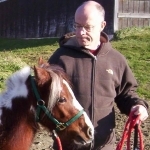Visit the Series Homepage
Vital Signs: Vermont Charts A New Course For Health Care
 (HOST) This week, VPR presents "Vital Signs," a series of Vermont Edition programs looking at health care overhaul and how it will change the way we get care. As part of the series, we’re bringing you perspectives on health care from VPR commentators. John Killacky says a painful personal experience underscores for him what’s at stake as changes are made – and what we have to be careful to preserve.
(HOST) This week, VPR presents "Vital Signs," a series of Vermont Edition programs looking at health care overhaul and how it will change the way we get care. As part of the series, we’re bringing you perspectives on health care from VPR commentators. John Killacky says a painful personal experience underscores for him what’s at stake as changes are made – and what we have to be careful to preserve.
(KILLACKY) Fifteen years ago, complications from spinal cord surgery paralyzed me from the neck down. Mind and body were totally separate. No thought could will back movement, stop the spastic jerking of my limbs, or unclench my claw-like left hand. Bladder and bowel control ceased. I stared back at the world, whimpering.
My mis-circuited body ever so slowly responded to the prodding of therapists and loved ones. My fingers began to unravel and my toes to wiggle. Six weeks in the hospital were followed by two months at home before I dared to navigate the outside world, assisted initially by a wheelchair and then a brace and cane. Today, years of physical therapy, yoga, and swimming give me more strength and range of motion – but still not a balanced gait.
Throughout my journey, I learned about grace through the unwavering support of friends and family. When my life disintegrated, my husband put his on hold. My mother and sisters traveled to assist. Friends and neighbors asked how they could help and were generous enough to mean it. To them I am grateful.
I am also thankful to the many health care professionals I encountered along the way. I worry about them in the current health care debates. Will the night staff in ICU have time to gently hold a patient’s head, trying to stop the blinding pain? Will nurses still bring joy into their care giving and not be too beleaguered?
I hope doctors will stop and linger, really listen to patient concerns, and not have to move along down the assembly line of daily rounds. I want psychologists and social workers not to be overburdened, so they can really help families cope with catastrophic illnesses. And physical therapists have enough space in their schedules to encourage every client with practical optimism.
In our future health-scape, will adequate time for recovery be supported? Rehabilitation recognized as ongoing? Experimental and alternative treatments encouraged? Can we, as a civil society, embrace pre-existing and chronic conditions? No one should have to ration prescriptions in order to eat.
I was fortunate. Coverage from my employer provided access to and paid for extraordinary care. In the structural reforms now being considered, I worry that insurance will become more restrictive, with increasing financial burden shifting to individuals. Health emergencies should not result in bankruptcy.
We cannot lose sight of people as we debate systemic change. Health care is human care. Tenderness and the power of touch cannot be streamlined. Our ultimate goal should be to heal the sick and care for one another; then we achieve a nurturing and humane bottom line.